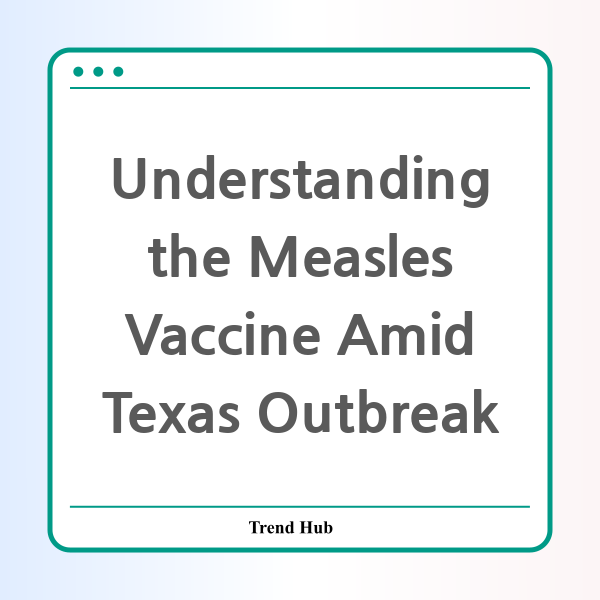* This website participates in the Amazon Affiliate Program and earns from qualifying purchases.

As concerns about a measles outbreak sweep across Texas, many are left wondering: Is the curve truly flattening, or is the situation more dire than it appears? With over 500 confirmed cases reported, it's crucial to understand the role of the measles vaccine and the importance of public health measures.
Recently, Health and Human Services Secretary Robert F. Kennedy Jr. suggested that the growth rate of measles cases in Texas has slowed, claiming that reinforcements from the Centers for Disease Control and Prevention (CDC) and increased vaccinations are making an impact. However, data from the Texas Department of State Health Services (DSHS) indicates that the outbreak is still escalating, with recent weeks alone seeing 81 new cases confirmed.
In light of these troubling statistics, it’s essential to look deeper into the broader implications of the measles vaccine and the urgent need for vaccination in under-served communities. Dr. John Brownstein, an epidemiologist, has warned against complacency, highlighting the risks posed by low vaccination rates. He emphasized that without immediate action, the potential for a wider transmission remains a significant concern.
With public health officials projecting a year-long timeline to control the outbreak, many experts believe that the true number of cases could be significantly underestimated. Epidemiologist Dr. Craig Spencer remarked that the rising death rate—three fatalities reported already—could suggest a higher incidence of cases than officially recorded. This alarming revelation underscores the need for public awareness and promotion of vaccination.
The measles vaccine is a safe and effective preventative measure. According to CDC guidelines, two doses of the measles, mumps, and rubella (MMR) vaccine can provide nearly 100% protection against severe outcomes from measles infection. Unfortunately, misinformation and hesitancy related to vaccinations continue to fuel outbreaks.
In the recent outbreak, some controversial treatment methods have emerged, such as aerosolized budesonide and clarithromycin, promoted by certain figures as remedies for measles. However, medical experts have refuted these claims, stressing that they are not recognized treatments for measles. The focus should remain on the MMR vaccine, which offers robust protection against the disease.
Moreover, Dr. Peter Marks, a former FDA official, emphasized the simplicity and necessity of getting vaccinated. Preventative measures, much like securing a child in a car seat, should be an effortless choice for parents. Despite potential vaccine hesitancy, discussing the risks and benefits with healthcare providers can guide families in making informed health decisions.
As we navigate through this outbreak, the significance of vaccination cannot be overstated. Parents and guardians are urged to ensure that their children are fully vaccinated against measles. As we continue to face health threats in under-vaccinated communities, every shot counts in protecting individuals and public health.
In conclusion, while some may claim that the situation in Texas is improving, the current data and expert opinions suggest that vigilance is necessary. Vaccination remains the most effective tool at our disposal to combat the spread of measles and to prevent future outbreaks. Parents, health officials, and community leaders must work collaboratively to promote vaccination and safeguard the health of the population.
* This website participates in the Amazon Affiliate Program and earns from qualifying purchases.